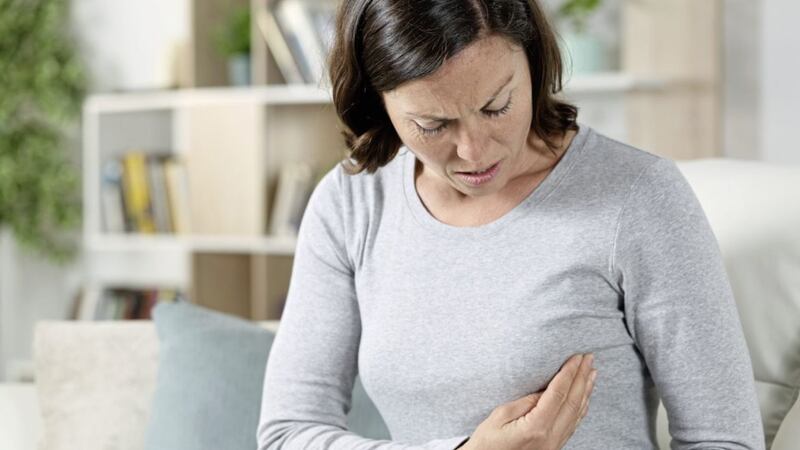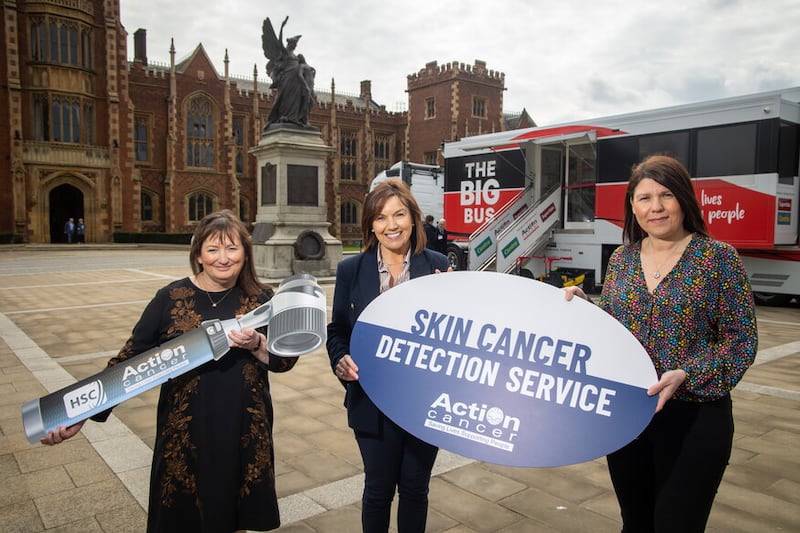WITH Northern Ireland now in the third week of the latest lockdown and the Belfast Health and Social Care Trust expecting 'many hundreds' of new Covid cases before the end of January, many people are still reluctant to contact their doctors about non Covid-related medical concerns.
But while the trust announced last week that it was cancelling all urgent cancer surgeries due to mounting pressure on NHS staff and a lack of bed space, leading cancer charities are urging people not to be deterred from speaking to their doctors about worrying symptoms or changes in their bodies.
In an attempt to reduce a backlog and a wave of later-stage diagnoses, which often require more intensive and expensive treatment than those diagnosed at an early stage, Action Cancer and Cancer Focus Northern Ireland say unusual symptoms should not be ignored, particularly related to the four main cancers – prostate, breast, lung and bowel.
Gwyneth Hinds, a doctor and board member of Action Cancer, points out that even if there are delays in surgery, investigations and other forms of non-surgical treatment can still be carried out.
And she says to bear in mind that not all symptoms turn out to be cancer.
“For the vast majority of people, they will be given good news that they don't have cancer,” she says. “The risk starts to increase over the age of 55. One third of all diagnoses are in people over 75, so if you're having problems with your bowels, for example, or you've found a lump in your breast, be reassured that you will probably be given good news.
“In saying that, there are things that should definitely not be ignored, especially when it comes to the Big Four cancers. For example, if men are having to urinate more at night-time, there's blood in the urine or the flow takes longer, it could be prostate cancer.
“If you have a persistent cough for a few weeks and a Covid test has come back negative or if you're coughing up blood, that needs to be investigated. Similarly, any changes in bowel habits, a persistent dull ache or unexplained weight loss, must be investigated too.
“A lump in the breast is something to always flag up but also, if you notice any changes at all, particularly around the nipples or skin that is pulled or dimpled, do not ignore these signs. Speak to your doctor straight away. Don't go to A&E. Your own GP knows you and your medical history and will refer you on if your symptoms are suggestive of cancer.”
Action Cancer offers interactive gender-specific Cancer Awareness sessions to workplaces and community organisations to increase knowledge of the signs and symptoms of common cancers and to help people learn how to reduce the risks of developing the disease. The charity also offers a Step into Action programme, delivered virtually.
It includes up to six one-to-one sessions with a health and wellbeing coach to help encourage and motivate people wanting to get healthier and is available to the general public.
In addition, Action Cancer provides a range of health checks aimed at increasing awareness of the importance of early detection and how a healthy lifestyle can help set you up for the future. These include blood pressure, cholesterol, glucose and body composition.
While the majority of people in the north who receive a cancer diagnosis do survive, over 4,350 sadly do die. With so much attention on personal health over the past 10 months, Gerry McElwee, head of cancer prevention at Cancer Focus Northern Ireland, says now is an opportune time to make small changes to our lifestyles, as we wait for the Covid vaccine to be rolled out.
“The good news is that up to 50 per cent of cancers can be prevented if we maintain a healthy lifestyle, have regular checks and use screening services,” says Gerry. “There’s no better time to make a switch to a healthier lifestyle.
“Focus on nutrition. Be a healthy weight. For most of us, as the amount of fat in the body decreases, so does the chance of certain cancers. Eat fruit, vegetables, grains and pulses and limit foods that are high in sugar, salt or fat. Avoid processed meat and limit red meat.
“Increase your physical activity. Try to take 75 minutes vigorous physical activity or 150 minutes moderate activity each week. Do things you enjoy. Cancer Focus NI is the official charity for the 2021 Deep RiverRock Belfast City Marathon. You could enter the marathon, fun run, relay or eight-mile walk. If Covid restrictions are still in place, you could do your own virtual marathon.
“Stop smoking. This is the single most important thing you can do to improve your health and lower your risk of several cancers and heart disease. Be UV aware, limit your alcohol intake and ensure your children take part in the vaccination programme for human papilloma virus (HPV), when it is offered to them.”
Gerry also urges people not to avoid contacting their doctor if a symptom is giving them cause for concern. He points out that symptoms are often caused by something less serious but that finding cancer early makes it more treatable and a talk with the doctor could help save your life.
“You are more likely to survive cancer if you spot the signs and symptoms at an early stage,” Gerry adds. “Take time today to familiarise yourself with the most common signs and symptoms and check your body for changes.
“Talk to your doctor if you notice anything unusual for you. The chances are that it will not be cancer, but getting it checked out is not wasting anyone's time.”
:: For information visit cancerfocusni.org and actioncancer.org
WHAT TO LOOK OUT FOR
BREAST CANCER – changes in shape of size of the breast, lump in the breast or under the armpit, dimpling, puckering of redness in the skin, nipple discharge, change in the position of the nipple, veins that stand out more than normal, a pain or odd sensation that isn't normal for you.
CERVICAL CANCER – bleeding after sex, bleeding between periods, bleeding after the menopause. Some women also have a vaginal discharge or pain in the lower pelvis.
OVARIAN CANCER – persistent bloating, pain in the pelvis and lower stomach, unexplained tiredness, loss of appetite, needing to pass urine more frequently, back pain.
TESTICULAR CANCER – small lump/hardness, swelling, tenderness, dull ache in the lower abdomen or groin.
PROSTATE CANCER – passing urine unexpectedly, passing urine several times a night, needing to strain to pass urine, urgency to go but barely producing a trickle, pain passing urine, discomfort such as pain or a burning sensation, dribbling after stopping, blood in urine.
BOWEL CANCER – blood in stools or bleeding from rectum, loose and frequent bowel movements lasting three weeks or more, abdominal pain, unexplained weight loss, extreme tiredness.
LUNG CANCER – a persistent cough, shortness of breath, coughing up sputum with traces of blood, persistent chest pain, fatigue, unexplained weight loss.
SKIN CANCER – Non-melanoma – spot or sore that doesn't heal within four weeks, spot or sore that continues to hurt, scab, bleed or itch, areas of skin that have broken down or formed an ulcer and doesn't heal within four weeks
Melanoma – (most commonly occurs on a mole) – change in size, colour, shape, loss of symmetry, itching or pain, inflammation, bleeding or crusting.








